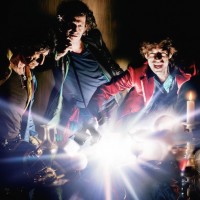So, the Rolling Stones have released a remastered version of 1971’s masterpiece Sticky Fingers. Similar to their reissues of Exile On Main St. and Some Girls, it’s available with an additional disc of previously unreleased outtakes and alternate versions. Coincidentally, just a few months earlier Led Zeppelin continued the reissue of their entire remastered catalog with the three-disc version of Physical Graffiti. On one hand, die-hard classic fans are more than happy to repurchase the albums they’re already owned their entire lives. In other ways, they probably aren’t getting more bang than they should be getting for their buck.
Perhaps the sonic updates alone are worth the price of the albums, and anything extra should be considered a gift from the rock gods. The evidence seems to indicate so; the lack of any real unreleased gems should be evidence enough that maybe the band got the choice and sequencing right the first time.
For instance, the Rolling Stones’ version of “Brown Sugar” with guest Eric Clapton looks tempting on paper, but comes across as fairly sloppy — and not in a good, loose, Rod Stewart and the Faces kind of sloppy. The unfaded version of “Bitch” is interesting, but raises the question: Where is the extended “Sway,” made famous as the legendary boot where Mick Taylor takes the entire band to a whole different level than just jammin’ in the studio? And wasn’t there some Mick Taylor work that ended up on the thrown-together Metamorphosis? One would think there should be other additional tracks from around the time period of Sticky Fingers.
At least Exile On Main St. offered up some completely different tracks, slight as they were. Sticky Fingers also contains some live recordings from 1971, but they would have been nice to hear in context with the rest of the original concert and not just cherry picked to fill up space on a CD.
Similarly, Jimmy Page’s decision to release “working mixes” of Physical Graffiti tracks manifests itself to listeners as a one-time-only event. Sure, it’s interesting to hear a work in progress, but that’s all it is. An earlier version of “In the Light” called “Everybody Makes It Through” is the only unique cut. Everything else sounds like rehearsals or rough mixes of songs that can be found in better versions on the original album.
Conspicuously missing in action is “Swan Song,” a piece which Page ended up taking with him when he put together The Firm with Paul Rodgers, and renaming it “Midnight Moonlight.” Again, it makes one wonder why second-rate rough cuts were chosen for release over outtakes that have been known by fans to exist for years, via bootlegs and more recently via the internet.
Maybe the simple fact is that many bands don’t have the huge back catalog the public thinks they do. For the Rolling Stones at least, it seems a lot of the time the tapes were rolling but the band was just playing around, searching for their mojo. Perhaps that was simply their modus operandi, and that’s fine, but it hardly seems worth most people’s time and money to participate retroactively in that experience.
It’s particularly unsatisfying to hear these anticlimactic reissues from two of rock’s legendary acts, particularly when others like Bruce Springsteen and the E Street Band do similar remastering projects but actually back up their claim to greatness by releasing 21 alternate tracks to the original ten found on 1978’s Darkness On the Edge of Town.
In other news, Tom Petty will soon be issuing an expanded version of 1994’s Wildflowers, to be called Wildflowers: All the Rest. Petty is another artist with a rumored huge back catalog, and Wildflowers was supposedly made during one of his very prolific phases.
Will this be the great lost alternate/addition in the Tom Petty canon, or just another way for a guy to earn a buck before the classic rock era finally comes to a close? In the end, it’ll likely be another game of wait and see: Rock ‘n’ roll has always been based on the anticipation of the next big thing, even if it was already the last big thing.
- How David Bowie’s ‘The Next Day’ Stripped Away All of the Artifice - March 15, 2023
- Why Deep Purple’s ‘Who Do We Think We Are?’ Deserves Another Listen - January 11, 2023
- In Defense of the Often-Overlooked Mott the Hoople - November 10, 2022




